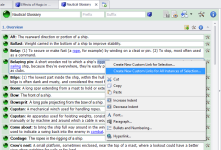I have a campaign that is lead in Polish Language. In Obsidian Portal, or any other wiki I could have created links on my own, which was great if the linked item didn't have exactly the same name as when it appeared in the text.
Polish language is constructed in the way, that makes something like that occur VERY often. The software is not able to detect links based on similar words, so I have to create them manually.
Example:
I have entry "Roześmiany Goblin" (rough translation of Laughin Goblin from Forgotten Realms. And also "Ren o' the Blade", who worked at that Inn. It's "Ren od Ostrza". So when I edit "Ren od Ostrza" entry I want to write:
"He worked in Laughin Goblin". In English it's not a problem, since the Inn has the same name when said in this content. But in Polish it becomes "Pracował w Roześmianym Goblinie". See, how "Roześmiany Goblin" is suddenly "Roześmianym Goblinie".
I don't expect you to code automatic detection of things like this(but it would be nice, and it's possible, but it requires a bit of lingistic knowledge and a lot of work). Problem is I can't create the link manually.
In the example above I still could fix it by writing "Pracował w tawernie Roześmiany Goblin" which translated to "He worked in Laughin Goblin Inn". But there are many situations where it either won't be possible or will be very strange in writing. For example if I wanted to write that heroes killed Ren o' the Blade most natural would be:
"Zabili Rena od Ostrza" (which won't be found because it's Ren od Ostrza in db). If I wanted the link I have to write "Zabili osobę zwaną Ren od Ostrza" which means "They killed a person named Ren o' the Blade". It's very unnatural, and when a lot of people will appear in one sentence or paragraph it will quickly get crazy. Imagine writing something like:
"And the person named Ren 'o the Blade met up with person named Nancy Drew with whom he journeyed to place named Mountain of Doom to defeat evil overlord with name Saruman". Strange, isn't it? And probably real world examples would be crazy, not merely strange.
Polish language is constructed in the way, that makes something like that occur VERY often. The software is not able to detect links based on similar words, so I have to create them manually.
Example:
I have entry "Roześmiany Goblin" (rough translation of Laughin Goblin from Forgotten Realms. And also "Ren o' the Blade", who worked at that Inn. It's "Ren od Ostrza". So when I edit "Ren od Ostrza" entry I want to write:
"He worked in Laughin Goblin". In English it's not a problem, since the Inn has the same name when said in this content. But in Polish it becomes "Pracował w Roześmianym Goblinie". See, how "Roześmiany Goblin" is suddenly "Roześmianym Goblinie".
I don't expect you to code automatic detection of things like this(but it would be nice, and it's possible, but it requires a bit of lingistic knowledge and a lot of work). Problem is I can't create the link manually.
In the example above I still could fix it by writing "Pracował w tawernie Roześmiany Goblin" which translated to "He worked in Laughin Goblin Inn". But there are many situations where it either won't be possible or will be very strange in writing. For example if I wanted to write that heroes killed Ren o' the Blade most natural would be:
"Zabili Rena od Ostrza" (which won't be found because it's Ren od Ostrza in db). If I wanted the link I have to write "Zabili osobę zwaną Ren od Ostrza" which means "They killed a person named Ren o' the Blade". It's very unnatural, and when a lot of people will appear in one sentence or paragraph it will quickly get crazy. Imagine writing something like:
"And the person named Ren 'o the Blade met up with person named Nancy Drew with whom he journeyed to place named Mountain of Doom to defeat evil overlord with name Saruman". Strange, isn't it? And probably real world examples would be crazy, not merely strange.



